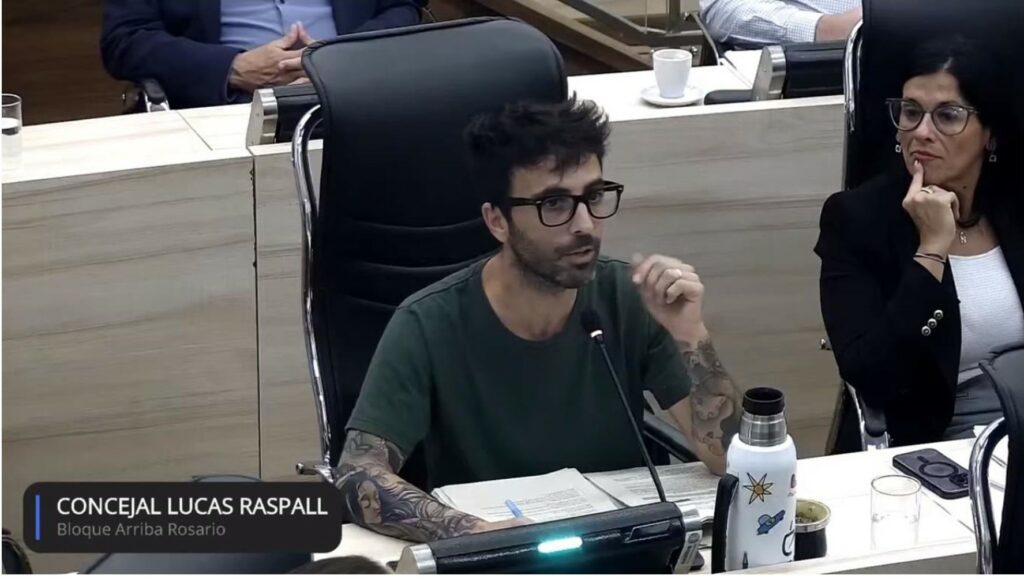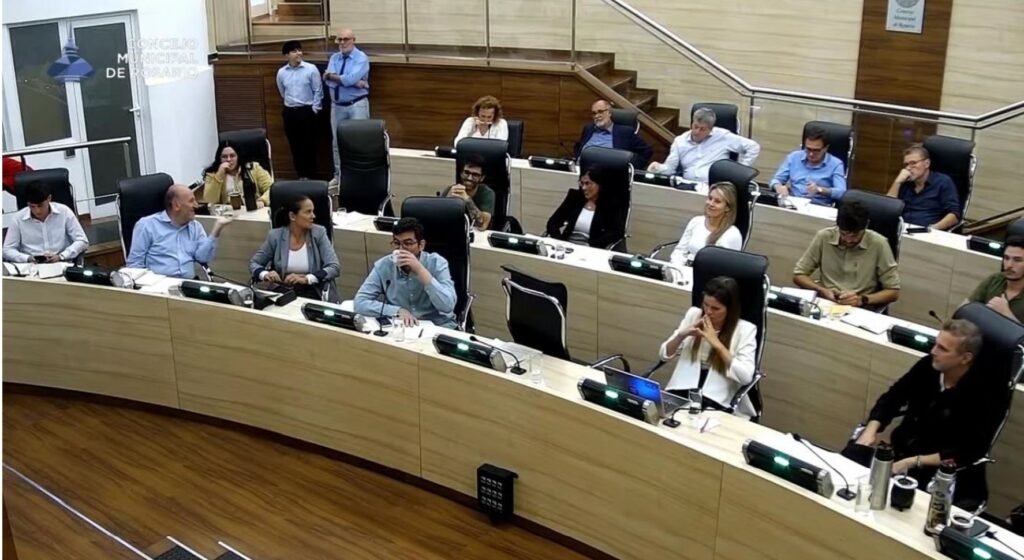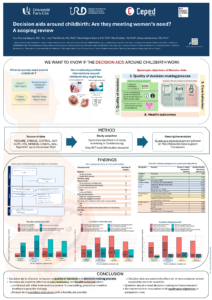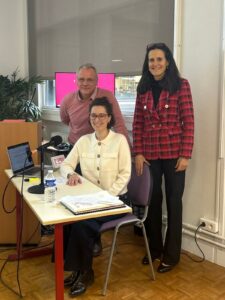The results of the QUALI-DEC international research project on the appropriate use of caesarean sections led to an ORDINANCE adopted on 11 April by the Municipality of Rosario (Argentina). This decision aims to promote and guarantee safe childbirth for all pregnant women and their babies, helping to reduce the abusive practice of caesarean sections in the region’s hospitals and clinics.
QUALI-DEC is an international research project born of the joint work of the IRD and its partners. Based on the often alarming observation that caesarean sections are over-used as a method of childbirth, this collective and shared scientific research project aims to reduce the practice of non-medically justified caesarean sections, particularly in emerging and low-income countries. Supporting and sharing knowledge with pregnant women and healthcare professionals is central to this project. Given that this is a societal problem and not just a medical one, it is a huge challenge to get all the stakeholders involved and to convince them to change practices, attitudes and policies in this area.
Rosario City Council unanimously adopted an ORDINANCE on the need to design and implement a “plan for the appropriate use of caesarean sections“. The first reason is that rates of caesarean section without clinical justification have risen sharply in Argentina, in many provinces and particularly in the city of Rosario. National statistics show that the caesarean section rate is 30-35% in the public sector, while the average in the private sector is 50%, reaching 75% and 80% in some private clinics. According to the WHO, the maximum threshold is around 15%, whereas overuse occurs when it exceeds 35%.
This ORDINANCE was also unanimously approved by Rosario City Council in view of the increase in maternal and perinatal morbidity/mortality, but also to contribute to respecting the legal framework for health, the inalienable rights of pregnant women and their empowerment.
The Rosario Council recalls that the consequences of inappropriate recourse to Caesarean sections have been the subject of warnings for decades. It states that when Caesarean section is clinically justified, its use reduces maternal and perinatal morbidity and mortality, but when rates of clinically unjustified Caesarean section increase, maternal and perinatal morbidity and mortality also increase. In addition, the excessive and unnecessary use of caesarean sections in low- and middle-income countries leads to an overuse of material and human resources essential to the care of the population, which has a negative impact on universal access to healthcare services and on the health of mothers and children. The use of unwarranted caesarean sections is often linked to non-clinical factors of various origins involving different actors, such as pregnant women and their families, healthcare teams and institutions, among others. To reduce unwarranted caesarean sections linked to these non-clinical factors, it has been shown that there are effective and safe non-clinical interventions, such as the strategy for implementing the QUALI-DEC intervention. This is a scientific research project which proposes a multi-faceted non-clinical intervention aimed simultaneously at healthcare professionals, pregnant women, their families and healthcare establishments in order to reduce the practice of non-medically justified caesarean sections. QUALI-DEC provides these players with practical tools to guide them in choosing the most appropriate mode of delivery, by combining four interventions whose safety and effectiveness have been demonstrated: 1- Companionship chosen by the pregnant woman; 2- Information tools to help pregnant women and healthcare professionals make informed decisions (information booklet and mobile application); 3- Audit of caesarean sections in low-risk groups (groups 1 to 4 of the Robson Classification), with feedback of the results and recommendations to the healthcare teams in the institutions; 4- Institutional opinion leaders to promote the use of clinical management algorithms supported by the most solid and up-to-date scientific evidence, and to oversee the implementation and compliance of non-clinical interventions.
The QUALI-DEC strategy focuses on how to implement these interventions appropriately and effectively, taking into account the local and institutional context. QUALI-DEC is currently evaluating and producing comparative information on implementation, simultaneously in four countries: Argentina, Burkina Faso, Thailand and Vietnam. Implementation in Argentina is being carried out by the team at the Centro Rosarino de Estudios Perinatales (CREP), a city institution with a national reputation, which works with the World Health Organisation, the Institut de recherche pour le développement (IRD) in France, the Karolinska Institutet (KI) in Sweden and the University College Dublin (UCD), University College Dublin (UCD) in Ireland, Khon Kaen University (KKU) in Thailand, Pompeu Fabra University (UPF) in Barcelona, Spain, the Institut de Recherche en Sciences de la Santé (IRSS) in Burkina Faso and Pham Ngoc Thach Medical University (PNT) in Vietnam. The QUALI-DEC strategy aims to promote health, the inalienable rights of pregnant women and their children, their empowerment, the use of best clinical practice by health professionals and the timely availability of the data needed to act positively in decision-making. The results obtained, not only in Argentina but also internationally, clearly demonstrate the value of this strategy, hence the need to transform the impact of these actions into public policy.

With all this in mind, the advisers who promoted this programme worked on the ORDINANCE project in collaboration with the Centro Rosarino de Estudios Perinatales (Crep), directed by Dr Guillermo CARROLI, who has been involved in international research on maternal and child health issues for decades. “We are basing our work on scientific evidence and on Crep’s enormous experience“, said one of the Councillors.
“The project involves obstetric services, and the whole team involved in childbirth is focused on empowering women who make better decisions when they are well informed“, said Councillor Lucas RASPALL, who added that evidence shows that as soon as they work in this direction, caesarean section rates start to fall.
For further information:
Funded by the European Commission (EC) and the World Health Organisation (WHO), the QUALI-DEC project represents: 500,000 births studied, 50 international researchers involved, 32 major partner hospitals, 1,500 healthcare staff involved, 4 dedicated communication officers…
o Article published in LACAPITAL magazine: https://www.lacapital.com.ar/la-ciudad/buscan-bajar-el-alto-numero-cesareas-que-se-registran-hospitales-y-sanatorios-rosario-n10127767.html
o YouTube link to the full Rosario City Council session of April 11, 2024: from minute 1:03:20 to minute 1:22:06, Councillor Lucas Raspall talks about the Plan proposal and other councillors support the initiative + unanimous positive vote https://www.youtube.com/watch?v=Fqh34WQDrso
o Link to Councillor Lucas Raspall’s presentation and comments on his Instagram : https://www.instagram.com/reel/C5q5bsTx4Ph/?igsh=MWJvYXRrdzVycnF1dg==
o Radio note from Radio Nacional journalist Sonia Tessa to Guillemo Carroli to comment to the public on the impact of this resolution on perinatal public health in Rosario: https://www.radionacional.com.ar/rosario-aprobo-un-plan-de-indicacion-adecuada-de-las-cesareas/
https://www.qualidec.com/en/home-en/ https://mooc.qualidec.com/








